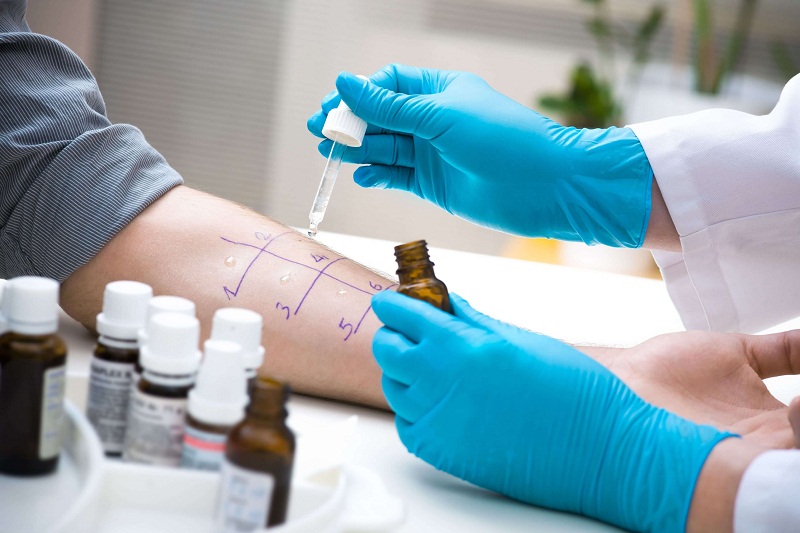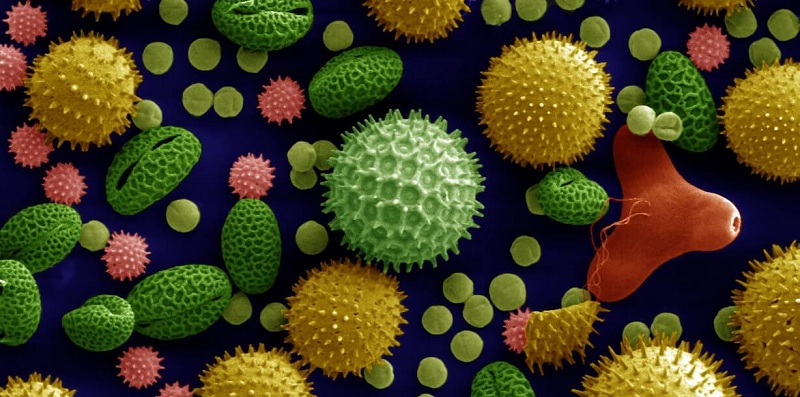Skin allergies are one way contact dermatitis manifests itself. It usually erupts after one or two days from contact with the allergen and can cause a lot of discomfort. Although rare, there have been cases where the allergic reaction first appeared a week after contact with the allergen. This is because some of them penetrate the skin slower than others. In this article, we are going to focus on the effects allergens have on our skin and how to soothe symptoms. Contact dermatitis caused by them (or, in short, a skin allergy) is the most common form of immunotoxicity in humans.
Allergies are nothing more than our immune system overestimating how dangerous some of the substances we come in contact with are. However, there are very complex and multi-leveled mechanisms behind every allergic reaction.
Time has proven that some substances only cause an allergic reaction when exposed to sunlight. This can happen with some cosmetic products as well as chemicals like paint thinners or cleaning products.
Symptoms of Skin Allergies
The first manifestation of skin allergies is usually red, swollen, and irritated skin. In some cases, where exposure was prolonged or the concentration of allergen was high, the first signs can be rashes or lesions that can either ooze, crust, or drain. If you do not treat them, these can lead to scaling or thickening of the skin.
Itching or stinging are also common symptoms of skin allergies. If you experience either of these two, it’s important to not scratch or touch the affected area. It’s because this could lead to bumps, blisters, or vesicles filled with clear fluid. Perforating or lacerating the skin while scratching is also common. This can lead to infections and exposes our bodies to multiple pathogens.
In some cases, the affected area can become warmer, more tender, and sensitive to touch. If you do not treat it, the skin can sometimes get darker and tougher.
Although most allergic reactions go away after a few days or even after a few hours from applying local treatment, there have been cases where symptoms disappeared completely only after one month of regular treatment.
Symptoms of Skin Allergies
The first manifestation of skin allergies usually is red, swelled and irritated skin. In some cases where exposure was durable or the concentration of allergen was high, the first signs can be rashes or lesions that can either ooze, crust or drain. If not treated, these can lead to scaling or thickening skin.
Itching or stinging are also common symptoms of skin allergies. If you experience any of these two, it’s important to not scratch or touch the affected area since this could lead to bumps, blisters or vesicles filled with clear fluid. Perforating or lacerating the skin while scratching is also common; this can lead to infections and exposes our body to multiple pathogens.
In some cases, the affected area can become warmer, more tender, and sensitive to touch. If you leave it untreated, the skin can sometimes get darker and tougher.
Although most allergic reactions go away after a few days or even after a few hours from applying local treatment, there have been cases where symptoms disappeared completely only after one month of regular treatment.

Common Questions about Skin Allergies
How can I get rid of my allergy?
Once developed, you cannot eliminate allergies. This is because allergies happen when an allergen is registered as threatening by your immune system. However, you can control the allergic reaction your body has towards certain allergens that you cannot stay away from.
Why am I now allergic to a sunscreen I used for years?
Although a recent change in the recipe of your sunscreen could have caused that, it is far more likely that you developed an allergy towards one of its ingredients.
Can stress cause skin allergies?
Most likely, stress alone cannot cause allergies, but it can aggravate existing allergic reactions. This happens because our bodies produce much more histamine, a chemical strongly related to our immune and allergic response, when under a lot of stress. However, we are more likely to develop new allergies when our bodies are vulnerable because of stress.
Causes of Skin Allergies
Most people inherit allergies, although some can be developed in their lifetime after repeatedly coming into contact with a certain allergen. It has been proven that stress increases the risk of developing new allergies since it affects the immune system most.
Most common allergens that cause skin allergies: nickel, gold, sap of certain trees, poison ivy/oak/sumac, certain fragrance mixtures, components of some antiseptics, formaldehyde, cobalt chloride, some resins, most photographic developers, quaternium-15, isothiazolinones, platinum soluble salts, mercaptobenzothiazole, latex, and the list can go on.
These allergens are present in a wide range of products from cosmetics to decorative pieces. Here is a more detailed list:
Most common products that contain these allergens: jewelry, buttons on clothing, deodorants, soaps and shampoos, nail polishes, sunscreens, hand sanitizers, perfumes and other toiletries, hair dyes, beauty creams, condoms, surgical gloves, first aid creams, antiseptics, dental products, insecticides, cement and other construction materials, paints and waxes, paper products, household cleaners, laundry detergent and softener, certain fabrics, pet food, metal-plated objects, and the list could go on.
How to Treat Skin Allergies
Before treating an allergic reaction, you must first identify the allergen that caused it and make sure you avoid contact with it again. After gently washing the irritated area with cold or warm water, apply a cold compress to relieve the itching. Letting the affected skin area breathe is also important since sweat or friction can worsen the symptoms. However, you should only do this while staying in a clean environment, preferably indoors.
Most Effective Ways to Treat Skin Allergies
Antihistamines
Antihistamines are effective and widely used in hospitals and homes, although we advise great care when using them at home. While corticosteroids work only on the local manifestations of skin allergies, oral antihistamines work from the inside by limiting the production of histamine, the substance responsible for our immune and allergic response.
Some are available over the counter, while others require a prescription. No matter which one you use, know that overdosing is extremely dangerous and could affect the immune system. Oral antihistamines also have a pretty long list of possible side effects. Hence, only use them if it is absolutely necessary.
Corticosteroids
Corticosteroids, like hydrocortisone, are the most used local treatments for skin allergy symptoms. They effectively reduce inflammation, itching, redness of the skin, and swelling. Along with the soothing properties, corticosteroids also prevent additional swelling or other complications.
Calamine
This is a gentle and soothing cream or lotion that relieves irritations and rashes while protecting the skin. It is especially suitable for those who experience skin allergy symptoms after touching certain plants that are known to contain allergens. This means it’s also a good choice for people affected by latex allergy. However, its efficiency is limited when talking about stronger chemical allergens, like cobalt chloride.
How to Treat Skin Allergies Naturally
There are quite a few efficient methods of relieving skin allergy symptoms with natural ingredients. Although each and every one of these would work just fine by itself, we recommend mixing them up for the best results.

Aloe Vera
Although known for its ability to relieve sunburns, Aloe Vera is one of the most useful and versatile plants. Its ability to soothe the skin makes it great for treating rashes and irritation. For best results, we recommend using the gel from a fresh leaf.
Oatmeal
Its great ability to reduce inflammation is due to the avenanthramide wheat contains. The best type of oatmeal for this is the plain one. You can ground and mix it with the bath water to soak in or with other ingredients to rub against the affected skin.
Chamomile
Chamomile is also great for abolishing the discomfort and irritation caused by skin allergies. In addition, it fights against inflammation and most of the bacteria, fungi, and viruses that could enter the bloodstream through an open sore that scratching can cause. Chamomile tea still holds most of the beneficial qualities of the plant. Cold tea compresses 3 or 4 times a day will visibly soothe the skin.
Calendula Oil
Calendula is a wonder plant when it comes to skincare. It has soothing, anti-inflammatory, antifungal, antiviral, antibacterial, and astringent properties. Its oil works best for soothing rashes and allergic reactions on skin. For the best results, leave the oil on the affected skin for a few hours.
Clay
Due to its astringent properties, clay is a great immediate treatment for most cases of contact dermatitis since it draws out the venom and allergens that are causing the reaction. The most recommended type is green clay (also known as montmorillonite or bentonite clay), which is virgin and untreated. Since the clay is powdery, you will have to mix it with cold filtered water and then apply it on the skin. After it dries out, you are free to gently wash the area and apply it again, if needed.
Other Natural Ingredients That Actively Fight Skin Allergies
These are pretty self-explanatory and can be mixed with other remedies in order to create a super-treatment:
- Apple cider vinegar
- A spoonful of baking soda
- Extra virgin olive oil
- Ground coriander leaves
- Non-iodized kosher salt
- Extra virgin coconut oil
- Petroleum jelly
Do’s & Don’ts of Skin Allergies
DON’T use lemon juice to treat rashes. Even though you will find this “cure” all over the Web, the acids will only burn and irritate even more.
DO wear long sleeves and long pants with socks when hiking in order to avoid contact with potential allergens.
DON’T smoke, or drastically reduce the number of cigarettes you smoke since this will interfere with any treatment’s progress.
DON’T use cosmetic products on the affected skin if the irritation is not completely healed.
DO change your diet to one that includes more fruits and vegetables.
DON’T scratch the itchy area.
DON’T ever touch an allergen that you are sensitive to again.
Living with allergies can be difficult. Fortunately, modern medicine is making it easier and easier to alleviate the discomfort they cause. Until we have a way to eliminate this uselessly exaggerated immune response towards substances that are mostly harmless to the human body, we will have to use these little cheats.
If you are fighting skin allergies, please tell us what’s your most efficient cure and what changes in your life improved the allergic response.

